HOW I GOT HERE - industry interviews by
Dave Paul
An inside look at people in the entertainment industry. From doormen, dj’s and promoters to venue owners, managers, and booking agents. In their own words find out how they got where they are, and where they are going.
MICHAEL KROUSE of MADRONE ART BAR
Interview conducted in 2015
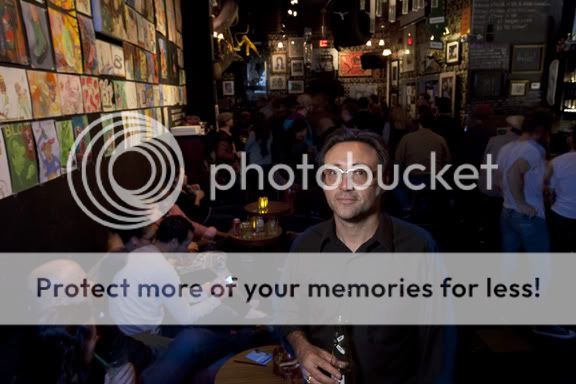
You grew up in Las Vegas. Can you tell us a little bit of history? How you went from growing up learning to draw comics, to artist, to moving to SF, and eventually owning and running Madrone Art Bar. I know it's a broad question but I'm sure everyone would like to know how you got here?
I was born in Las Vegas; when the population was less than 100,000 residents. It was at that time, still a small town with a big reputation. I'd like to say that the small town I grew up in no longer exists. The miles of endless desert I used to ride my BMX and construct forts in is now all covered by miles upon miles of concrete, strip malls and track homes. As I look back on things as an adult, and after the death of my parents I guess you could say I lived the stereotypical Las Vegas life of the 70's and 80's. My father (a WW2 fighter pilot, who retired from the navy and became a gambler) was 22 years older than my mother, (a holocaust survivor who became a burlesque dancer then a cocktail waitress). Las Vegas in the 70's was a different world, but normal to me. As a young child I remember going to the Casino's with my parents. (Picture at Caesars Palace 1973) My dad played poker almost every day, and some days I would tag along. However, I usually ended up at the swimming pool. The Desert Inn Hotel had a High Dive at the time. I used to love that pool. I also poured my first drink for my dad, Beefeaters Gin on the rocks in a pint glass. Rocks to the top, gin to the middle. Looking back on it, I was always surrounded by a drinking and entertainment culture, but it was never negative or neglecting. My dad was a military disciplinarian, his rules were not meant to be broken and it was from him that I learned how important all the details are. He always stressed preparation and taught me to be tenacious if I wanted to achieve something. And my mother was the creative one; we used to draw pictures all the time. As a kid I loved to draw and she encouraged me to be creative, while my dad would yell at me, "I dont care what you do, just be good at it."
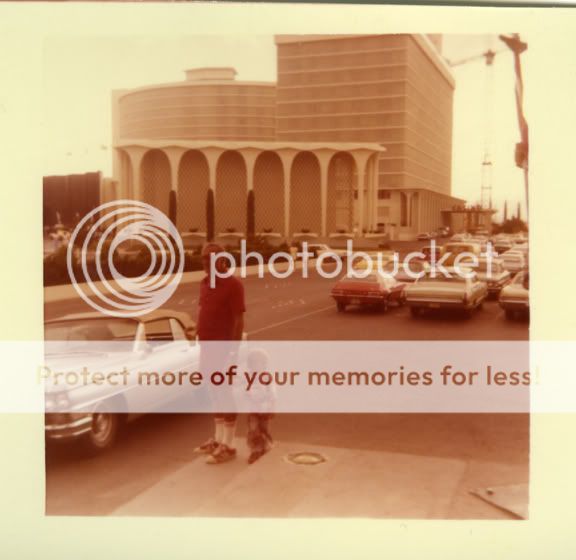
When I was 17, I moved to Milwaukee Wisconsin to attend college, and as a freshman I lived in a dormitory that was called the "BEER CAN" because it actually looked just like one. Little did I know Milwaukee, "The beer capital of the world" had such a strong drinking culture, "(PBR, Miller, Blatz, Schlitz Leinenkugals, & Sprecher just to name a few) and there I was thrust right into the middle of it. The drinking age had just recently switched from 19 to-21, so allot of the kids were still grandfathered in. Seeing an opportunity, I set up my dorm room as a fake ID studio; I drew three states, Indiana, Ohio, and Illinois. They were $50 a pop. I did really well. One day I was walking around, and I stopped in a bar and asked if they needed help. Even though the drinking age was 21, you could work in one at the age of 19. I was hired as a bar-back. A few months into it and luckily for me, someone didn't show up for work. So I was promoted on the spot. The owner told me, "If you don't know what it is ask someone." This place was three clubs all in one and was loaded with history. From Heavyweight title fights, to Sinatra to Dylan to the Sex Pistols to Pearl Jam. The basement was a college bar, with bowling lanes; the first floor was an intimate live music venue for about 200-300 people. And the top floor ballroom was large enough for about 1000 plus people. I saw so many great bands before they were big, Pearl Jam, Smashing Pumpkins, Red Hot Chili Peppers, and lots of others. They hosted everything from boxing matches, to ethnic dance parties. One night I was a cocktail waiter for 800 Milwaukee women who all came to see the men of Chippendales. That was one crazy night. I worked at the Eagles Club for 4 years.
Then I moved back home to Las Vegas, and I did a very short stint working for Mirage Resorts, at the time they had plans to open the Bellagio, and I was hired into a management-training program. You would spend a few months in each area of the Hotel and Casino. My first three months I had to wear a pirate outfit. I have a great story about an old NFL player, now a broadcaster who got taken by two hookers for about $17,000. Ask me about it one day.
Knowing that I did not want to stay in Las Vegas, I packed my car and headed to Seattle, where I knew the Grunge scene was blowing up. On the way there I spent a week visiting San Francisco. After I arrived in Seattle in 1992, Grunge was now mainstream, I was a few years late. I decided to turn around make San Francisco my home. One day, I had a job interview at an advertising agency. I showed up with comics and was hired as a copywriter. The guy I worked for "John McDaniel's" was the owner and creative director. He was in his 60's at the time. He was the guy who wrote the "Pardon me do you have any Grey Poupon" ads that were famous. But he was also a guy who used to write and draw single panel ads. He was a great mentor, he flat out told me to get out of advertising while I still could. I worked by his side for 1 year and a half and I learned from him how you build a marketable identity. It was a very valuable year and a half. Then the agency was sold and he was forced into retirement. I didn't like the new owners, so I took the severance package, and moved to Paris. While in Paris I worked on my comics, and introduced myself to pretty French girls that smoked allot.
After a year, I ran out of money, and moved back to SF, with the intention of submitting my comics to syndicates and magazines. At this time I returned to bartending. It was the best way to earn cash, meet girls, and have my days free to draw. I was diligent on making work, so I maintained a rigid schedule that allowed me to be productive. I had a comic strip "MAN VS WOMEN" that was a finalist for syndication, but in the end they went with another artist. I also sent stuff to the NEW YORKER, they never did publish me, but I did receive great advice from the art editor at the time, Lee Lorenz. After I sent in enough single panel gags, I finally got to talk with him. I flew to NY, and he schooled me. He showed me how diverse and talented all their artists were. They were not just cartoonists; they were Pulitzer Prize winners, playwrights, fine artists, poets and novelist. He told me to go learn how to paint or write, and my comics would get better in the long run. I took his advice, I came home and picked up a paintbrush and realized that I had so much more to learn.
Then for the next 15 years in San Francisco, I worked as a bartender in all kinds of different places, from dive bars to music clubs to high-end restaurants (Echo, Lulu's, Bruno's, The Boom Boom Room, Jiana's, Tunnel Top, Paragon, Tony Niks, Ace's and some others). I made a point of working in as many different environments as I could, and in different capacities. In each place I worked I learned something. I learned from good owners and bad owners, and fellow staff members as well. Things to do and things not to do. I also met quite a few talented DJ's and Musicians along the way. As an artist I was having shows of my work and was lucky that people liked my work and were willing to pay for it. I was also the Director of Exhibitions at Root Division for the first 5 years of their existence. Sad as it is, most artists still need income to supplement their art making life. Which usually means they need another job. They teach, work as installers, framers, construction workers, wait tables, and bartend. One pivotal day I sold a painting and had $5000, I ended up buying a parking spot in SOMA, for $25000. I put the $5000 down, and put $20000 on a credit card. My plan was to rent it out, then after a year, some guy with a $100,000 Porsche offered me $50,000. I said no, and he offered me more, and I said no again. Eventually we agreed on a price. After that I realized that I should work towards getting a bar. I spent 5 years or more looking and trying. More failed attempts, I kissed allot of frogs, until I found my princess.
I always had a list of bars that I liked for various reasons and Madrone Lounge was one of them. I liked it for its potential. I liked the space, and I liked the fact the previous owners concept was very similar but still different enough from mine.
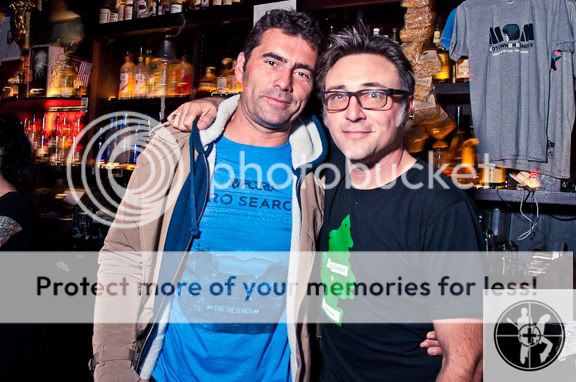
Finally when the phone call came from the old owner, Leila, I was ready to act and move quickly. Five years of failures had forced me to be ready when the opportunity finally presented itself. I asked my friend (Ludo Racinet) and owner of the Tunnel Top, where I had bartended for 8 years if he would invest in me, and he did. Without his help, it would have never happened. Which I point out because sometimes everyone needs a little help to make things happen. It's very hard to pull things off alone.
And then low and behold: I stopped calling it a Lounge and Madrone Art Bar was born.
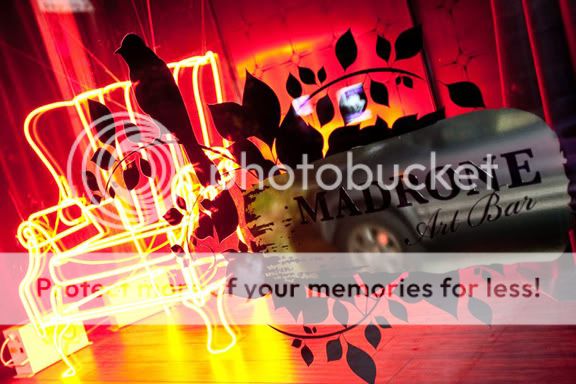
Word has it that the average profit margin for a regular bar is around 10-15%, and if doing real well 20-25%. Does this sound about right? What do you consider a good percentage of profit for a bar?
That sounds about right, but there are allot of variables that can come into play. I guess that depends on the bar. I've always been a believer that if you try and create a unique environment that caters to all the diverse people of this city and then try your hardest to have them leave happy, the rest will take care of itself. I guess we are doing well, but I also believe in re-investing heavily into the bar and creating an evolving space that's truly alive. I'm a big believer of the you have to spend money to make money. I also want to be around for a long time so longevity is important. Some people do well fast then fizzle. I would much rather have lower profit margins in the short term in exchange for a long-term success. Great bars will stand the test of time; they move beyond trends and help define the moment that they exist. Then if the owners are up to it, they can become a fabric of the community and last for a very long time. All big city's and especially San Francisco are full of great bars like this.
Since you took over Madrone two years ago I've noticed a lot of changes. New furniture and a great drink menu (fun drinks like the Ike Turner - a shot of Hennessey and a slap on the face). What other changes have you made that you feel has attributed the the current success of the establishment?
Believe it or not it's been 3.5 years, and every dollar I made in year one was re-invested. One of the big negatives of the bar was the way in which it was initially designed architecturally. They put the bathrooms, smack dab in the middle of the room. They couldn't be in a worse spot. But since I spent every dollar I had to buy the bar, I was forced to accept it. So I changed the Fung Shwei of the bar, by flipping the room. Putting a stage at the front opened the room up, and allowed people to get to the bar, so they could order a drink. I changed the way the bar operated, by creating a better workflow for the bartenders. It was like restoring an old car. I saw it as an old Corvair, but it had a Yugo engine. Everything that affected the way the bar felt and flowed was changed, lighting, sound, and chairs, even the glassware. Something so trivial to some can be the difference between success and failure. I created a training program for the staff, so that they could make high quality complex drinks but in a fast way, and I provided them with one of the largest spirit selections in the city to play with. However all that is just the foundation, then comes the people that you chose to surround yourself with, and I can honestly say that I have the best staff any bar owner could ask for. And when I say staff I mean from the cleaner to the bartenders to the doormen, to the DJ's, to all the musicians that play here. All of them are wonderful people to be around. I am thankful to all of them for their professionalism.
Most people think it's fun owning a bar or working in the nightlife business. But it can be long hours and tiring.
It's a grind, and yes the hours can be very long, but the reward, and the satisfaction of being your own boss are worth it. There have been many days where I have arrived at 8AM and left at 3AM. People think its all a party, every day. Sometimes it can be, but no person can maintain that lifestyle. The party needs to be for the guests. Dont get me wrong, it is fun, but it's also a shit load of work, especially in the beginning. Ask me if it's glamorous when some girl just threw up her spaghetti Bolognese in the bathroom sink and I am putting on the rubber gloves. Yeah! We have a staff rule, if you're the first one that gets told someone puked, it's your job to clean it. No passing of the buck, but somehow people know I'm the owner so they always tell me.
How do you juggle family life with your career? How do you relax and what do you like to do in your spare time (if there is even such a thing as 'spare' time)?
Juggling family life with career is easy when your family and the people you love support what you do. My wife is my biggest champion, and always supportive of what I decide to do. When I was in my five years of failed attempts to get a bar, she was always a believer. She also worked her ass off and put the money she made into my/our goals. When I relax, I'm sleeping. I like to spend time with my with my wife and daughters, and our dogs. They help keep me focused. For me there is no such thing as spare time. Between Madrone, my family and maintaining an art practice, that is it. But I like it that way. It's very satisfying.
I've heard other bar/club owners tell me they don't care what people write on Yelp. That they don't matter or if they do respond to the comment they write something nasty back to the reviewing. I have noticed that you really make a conscious effort to respond on Yelp and if someone felt they were wronged to make it right. Or if they are simply wrong in their review to point out things to them and clarify the situation. Why do you do this, and do you think it makes a difference with the public?
Hell yes, I care. I care allot! Just like that "Faith No More" song. When you put in as many hours as I have into making this place work, you can't help but care. In all honesty, I'm not a huge fan of Yelp, but in this day and age Yelpers cannot be ignored. Every detail must be addressed. I see Yelp as a great barometer of how something is working or not working, what I don't like is the way some people just parachute in and start making comments without actually observing anything. Like the guy who says, "I don't know why it's called an ART BAR." Hmmm, as if the 52 pieces of art on every section of wall and ceiling don't explain that. Or someone comes in and acts like an idiot, gets drunk, gets asked to leave, and has 5 friends write lies about the space or the staff. However if you remove that 10% of ignorant people then the rest of the reviews can be very insightful. I read them all, and I try and respond to most of them, either with a simple thank you, or if we screwed up (and we do) I try and make it right. Everybody has off days. Or if I can tell that the reviewer is mistaken, I try and point out why in a considerate way. Allot of people complain about the $5 cover on the weekends, and I always like to point out that this is the way I can afford to pay the DJ's what they deserve to be paid. Without the cover, I can't maintain the level and consistency of talent that I have here. It does make a difference; because when I point out things to people they realize that I care about my business. That I care about my customer's experience. I want them to leave satisfied.
Some dj's think they can just show up and dj, but those days are long gone. The dj also has to be a promoter. For dj's working at bars and clubs what advice can you give them to have a better turnout?
The DJ's that just show up and play will have a short shelf life in this business. I probably get 10-15 DJ and band submissions a day, and 90% of them are so unprofessional, and off point its ridiculous. "Yo let me come in an kill your club, I know how to make the people move." RIGHT! I look for people who understand the concept of building a following and growing an audience. Anyone can get their friends to come to the bar, but can they get the people that don't know them. The people that come because the music and the vibe are on point. Your friends might come the first 2 times, but will they continue to come on the 10th, and the 100th time. Madrone is a small venue and I want the DJ's that play here to build the brand of their night so that it expands beyond here. It has to in order to be successful. For example, your night; Prince + Michael now plays all over the country, and in most cases, much bigger venues. The FRINGE night "Indie Rock Dance Party", has a developed its own identity, and now plays in much larger venues around the city. The M.O.M Motown on Mondays has done the same thing and is expanding to LA, Hawaii and Detroit. Wil Blades plays music all over the world and the Tropicana DJ's are major players in the Latin music scene. As a bar, people know that Madrone will have good music, and a diversity of different styles. We will have people come here just for that alone, because they know that to be the case. But when the DJ's have a good understanding of branding a night, and building a loyal following, then its a win-win for everyone.
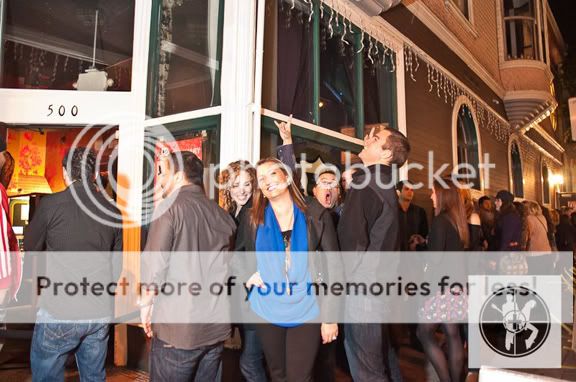
The calendar for Madrone seems to be nicely tuned. Between the art installations and the entertainment Madrone is a hot spot right now. I know a lot of dj's that are dieing to get a night there. How are you going to make sure Madrone stays "hot" over the next few years?
I am going to make sure that the bar stays, "alive." I will assume nothing; every murmur of the customers will be acted upon. Mistakes will not be repeated and I will constantly observe trends, and move beyond them. I don't know everything, but I am always willing to listen to people's comments. And I will continue to look for innovative professional entertainment that will always differentiate us from all the other bars in the city. Oh yeah, and I will always hire the best people.
Sean Penn and Drew Barrymore have both been to Madrone. Have there been any other celebrities or people that have been through Madrone that you thought, wow, that was cool they came in?
I think its more cool that so many people chose to come back here over and over and over. They are the ones who count. As for celebrities, we get our fair share. One slow Sunday night Lady Gaga came in and no body recognized her. She just blended in. She had drinks with a few band mates and listened to Wil Blades on the Organ.
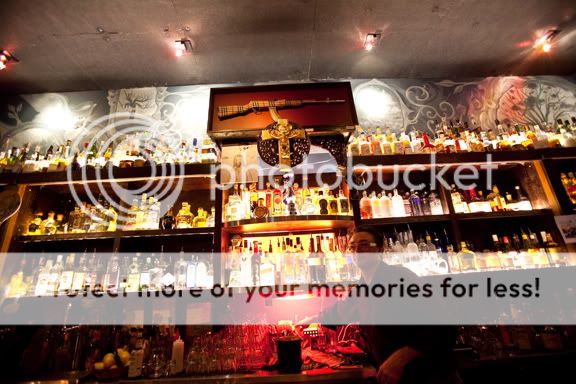
What's next for Michael Krouse?
One day at a time, but hopefully I will continue to present myself with new challenges daily that keep me excited. And those challenges can manifest themselves in many forms, from making new artwork, to a new venue, or even just trying to be a better person.
note - Madrone Art Bar is located at 500 Divisadero @ Fell, San Francisco, CA 94117
________________________________________________
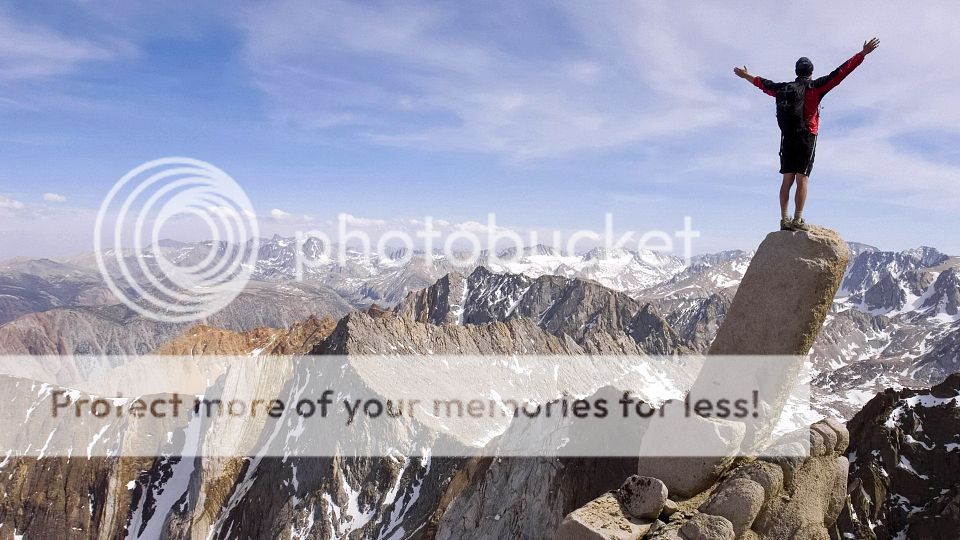
About the interviewer
Dave Paul began his music career in 1984, starting as a mobile dj and evolving into a prominent college radio dj, club dj, and remixer in San Francisco. In 1991 he launched the now legendary publication The Bomb Hip-Hop Magazine and in 1996 Paul transformed the magazine into a record label. The company was named "one of the fifteen independent labels that matter" according to Rolling Stone and the labels Return of the DJ series was ranked by Spin Magazine as #25 in their 90 Greatest Albums of the 90's list. Dave Paul has appeared on the front cover of Billboard magazine, and is featured in the motion picture Scratch. Mr. Paul has dj'ed throughout the US, toured Europe, released over 100 projects on his record label and currently produces themed dj parties including the 13 year running Prince and Michael Experience. If you feel you are qualified and would like to be interviewed you can contact Dave Paul at - bombhiphop@gmail.com
Already interviewed:
Robbie Kowal of SunsetSF (San Francisco) - INTERVIEW
Dave Paul of Bomb Hip-Hop (San Francisco) - INTERVIEW
Michael Krouse of Madrone Art Bar (San Francisco) - INTERVIEW
Mike Maietta of CEG Presents (New York) - INTERVIEW
Scheduled to be interviewed:
to be announced






